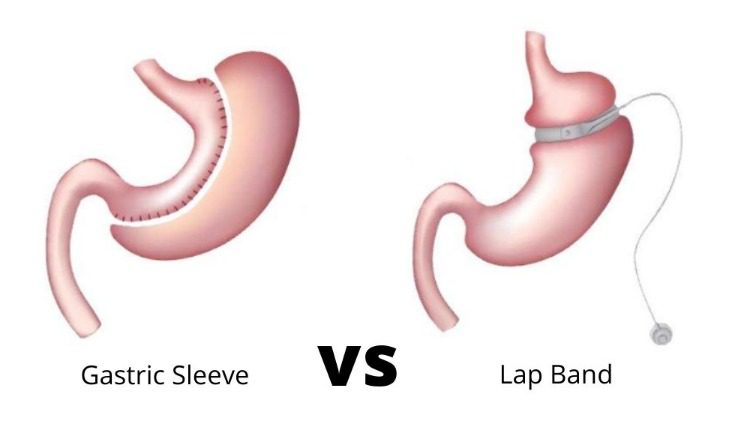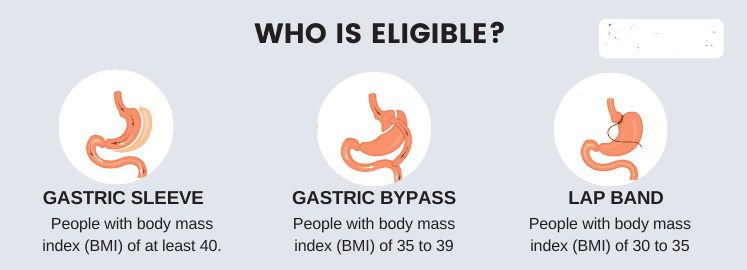
Lap-Band & Gastric Sleeve Surgery – Differences & Benefits
Is a Gastric Sleeve Procedure Like a Lap Band? What is the difference between gastric sleeve and lap band surgery?
Table of Contents:
Last Updated on April 24, 2024
Lap Band vs. Gastric Sleeve
When considering options for bariatric surgery, understanding the key differences between the various procedures available is crucial. Two common types of weight loss surgeries are the Lap Band and Gastric Sleeve surgeries. Both are performed laparoscopically and are designed to reduce the stomach’s capacity, limiting the amount of food intake and promoting weight loss. However, while they share some similarities, their approaches and outcomes differ significantly.
Lap Band Surgery involves the placement of an adjustable band around the upper portion of the stomach, creating a small pouch that limits food intake. This procedure is reversible and adjustable, allowing for personalized treatment based on the patient’s progress and needs.
Gastric Sleeve Surgery, or sleeve gastrectomy, involves removing about 70% of the stomach, significantly reducing its size permanently. This not only limits food intake but also affects the production of ghrelin, the hormone that stimulates appetite, which can lead to a more profound and sustained weight loss.
Both procedures aim to assist patients in their weight loss journey, but they cater to different needs and lifestyles. Choosing the right surgery involves understanding these differences in mechanism, effectiveness, and impact on one’s health and lifestyle. This article explores these critical distinctions to help potential candidates make informed decisions aligned with their health goals and medical advice.

Mechanics and Outcomes of Lap Band Surgery
Lap Band surgery, officially known as laparoscopic adjustable gastric banding, is a reversible bariatric procedure that involves placing a silicone band around the upper part of the stomach. This creates a small pouch that restricts the amount of food the stomach can hold at one time, thereby helping to control food intake and promote weight loss.
Mechanism of Lap Band: The adjustable band can be tightened or loosened over time to change the size of the passage between the two parts of the stomach. This adjustability allows for personalized treatment, enabling the modification of the stomach’s capacity based on the patient’s weight loss progress and tolerance to the band.
Outcomes of Lap Band Surgery: Initially, lap bands were widely used as a less invasive alternative to gastric bypass surgery. Patients typically experience gradual weight loss with the lap band, primarily because it solely relies on restricting food intake without affecting nutrient absorption or hormonal balances.
Challenges and Considerations: Over the years, the popularity of lap band surgery has declined due to several factors. The need for ongoing adjustments to the band, which requires regular follow-up visits to a healthcare provider, can be a significant drawback for many. Moreover, there are risks such as band slippage, which can lead to complications or diminished effectiveness of the procedure.
Decreasing Popularity: Despite its benefits, the lap band accounts for a smaller number of bariatric procedures today compared to other surgeries like the gastric sleeve. This shift is largely due to the lower overall success rates and the higher incidence of postoperative complications and required adjustments associated with the lap band method.
Sources-
- American Society for Metabolic and Bariatric Surgery (ASMBS): https://asmbs.org/patients/procedures/laparoscopic-adjustable-gastric-banding
Benefits and Process of Gastric Sleeve Surgery
Gastric sleeve surgery, or sleeve gastrectomy, is a permanent bariatric procedure that involves the surgical removal of approximately 70% of the stomach. This drastic reduction in stomach size not only limits the amount of food one can consume but also significantly impacts hormonal signals related to hunger and satiety.
Process of Sleeve Gastrectomy: The procedure is typically performed laparoscopically, which involves making small incisions in the abdomen. Through these incisions, a large portion of the stomach is removed, leaving a banana-shaped “sleeve” that serves as the new, smaller stomach. This reduced stomach capacity greatly limits food intake and accelerates satiety during meals.
Impact on Hormone Ghrelin: One of the pivotal effects of gastric sleeve surgery is the reduction in the production of ghrelin, often referred to as the “hunger hormone.” With a significant portion of the stomach removed, the cells that produce ghrelin decrease, resulting in lower levels of this hormone, which helps reduce appetite and increase feelings of fullness sooner.
Advantages Over Lap Band: Gastric sleeve surgery offers several advantages over lap band surgery:
- Higher Success Rates: Gastric sleeve patients typically experience more significant weight loss outcomes, losing 65-70% of their excess weight within 12-18 months after the procedure.
- Fewer Adjustments Required: Unlike the lap band, which may require frequent adjustments, the gastric sleeve is a one-time procedure with no need for further mechanical adjustments.
- Reduced Risk of Complications: Gastric sleeve has a lower risk of long-term complications compared to lap band surgery, such as slippage or erosion, which can occur with the adjustable band.
- Benefits for Other Medical Conditions: The significant weight loss achieved through gastric sleeve surgery also helps in resolving or improving other weight-related medical conditions, such as type 2 diabetes, high blood pressure, and sleep apnea, more effectively than the lap band.
Lap Band vs. Gastric Sleeve – Success Rates and Recovery Times
Comparing the success rates, potential complications, and recovery experiences between lap band and gastric sleeve surgeries provides critical insights for individuals considering these bariatric options. Below is a detailed breakdown that includes a table for clear visualization of these key aspects.
Success Rates
Gastric sleeve surgery generally shows higher success rates compared to lap band surgery. On average, gastric sleeve patients lose about 65-70% of their excess body weight within the first 12-18 months post-surgery. In contrast, lap band patients typically see slower and less substantial weight loss.
- Lap Band Success Rates: Gradual weight loss, with patients often achieving 40-50% excess weight loss, depending on adherence to dietary adjustments and follow-up care.
- Gastric Sleeve Success Rates: More rapid and significant weight loss, with the majority of patients losing 65-70% of their excess weight within the first year to year and a half.
Recovery Times
The recovery process for both surgeries varies slightly due to the differences in surgical intervention.
- Lap Band: Most patients can return home the same day of surgery and resume normal activities within a week, though full recovery and optimal adjustment of the band might take longer.
- Gastric Sleeve: Patients usually spend one night in the hospital and typically resume normal activities within two weeks. The recovery phase focuses on adapting to a significantly reduced stomach size.
Potential Complications
Both procedures carry their own set of risks and potential complications, which can affect the choice between the two.
- Lap Band Complications: Includes band slippage, erosion, and the need for reoperation or adjustment. Long-term complications can impact overall success and may require additional interventions.
- Gastric Sleeve Complications: Includes risks associated with major surgery such as infections, bleeding, and in rare cases, leaks from the staple line.
Table of Comparison: Lap Band vs. Gastric Sleeve
| Feature | Lap Band | Gastric Sleeve |
|---|---|---|
| Success Rate | 40-50% excess weight loss | 65-70% excess weight loss |
| Recovery Time | Home same day, normal activities in 1 week | Overnight hospital stay, normal activities in 2 weeks |
| Potential Complications | Band slippage, need for adjustments | Infections, bleeding, staple line leaks |
| Weight Loss Speed | Gradual | Rapid |
Conclusion – Difference Between Lap Band and Gastric Sleeve
When choosing between lap band and gastric sleeve surgeries, it is essential to consider these factors in light of personal health goals and medical advice. Gastric sleeve generally offers higher success rates and more rapid weight loss but comes with the risks associated with more invasive surgery. Conversely, the lap band presents fewer surgical risks but requires ongoing adjustments and can lead to slower weight loss.
References
-
American Society for Metabolic and Bariatric Surgery (ASMBS). (n.d.). Laparoscopic Adjustable Gastric Banding. Retrieved from https://asmbs.org/patients/procedures/laparoscopic-adjustable-gastric-banding
-
American Society for Metabolic and Bariatric Surgery (ASMBS). (n.d.). Sleeve Gastrectomy. Retrieved from https://asmbs.org/patients/procedures/sleeve-gastrectomy
-
National Institute of Diabetes and Digestive and Kidney Diseases (NIDDK). (2021). Bariatric Surgery for Severe Obesity. Retrieved from https://www.niddk.nih.gov/health-information/weight-management/bariatric-surgery
-
Buchwald, H., Avidor, Y., Braunwald, E., Jensen, M. D., Pories, W., Schauer, P., & Wolfe, B. M. (2004). Bariatric Surgery: A Systematic Review and Meta-analysis. JAMA, 292(14), 1724-1737. doi:10.1001/jama.292.14.1724
-
Mechanick, J. I., Youdim, A., Jones, D. B., Garvey, W. T., Hurley, D. L., McMahon, M. M., … Kushner, R. F. (2013). Clinical Practice Guidelines for the Perioperative Nutritional, Metabolic, and Non-surgical Support of the Bariatric Surgery Patient—2013 doi:10.1007/s11695-012-0782-2
Lap-Band Surgery vs. Gastric Sleeve: FAQS
What dietary changes are required after bariatric surgery?
Post-surgery diets progress from liquids to pureed foods, then soft foods, and finally regular foods within a few months, emphasizing protein intake and hydration.
How long does it take to see the full benefits of gastric sleeve surgery?
Full benefits, including maximum weight loss and improvement in comorbid conditions, are typically observed within 12 to 18 months post-surgery.
What psychological support is available for bariatric surgery patients?
Many clinics offer counseling and support groups to help patients adjust psychologically to life after bariatric surgery and maintain weight loss.
Can bariatric surgery improve type 2 diabetes?
Bariatric surgery can significantly improve or resolve type 2 diabetes by reducing body weight and altering gut hormones that affect insulin sensitivity.
What are the long-term lifestyle changes recommended after bariatric surgery?
Long-term changes include a balanced diet low in calories and sugars, regular physical activity, and ongoing medical monitoring to ensure sustained health
To find out more about the gastric sleeve procedure, read our article “Gastric Sleeves: How They Work, Surgery, And Who Should Have It”.

Are you considering weight loss surgery?
Find some answers on whether you qualify by completing our Qualification Questionnaire and reading our latest blog post “Do I Qualify For Gastric Sleeve Weight Loss Surgery?“.
Our team at The Sleeve Clinic, one of the top rated weight loss clinic in Toronto and Mississauga is dedicated to providing comprehensive care and support throughout your weight loss journey. Dr. Gmora is one of the highest-rated bariatric surgeon in Ontario according to RateMDs.
For more insights and personalized advice, don’t hesitate to reach out to us. Let’s take the first step towards your healthier future together. Click here to contact us today.





